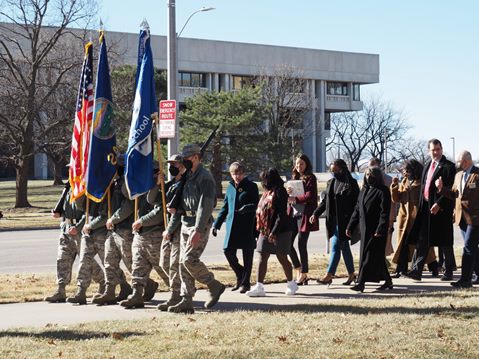Topeka – Gov. Laura Kelly on Friday announced additional efforts the state is taking to combat COVID-19.
Gov. Kelly deployed 80 nonmedical soldiers and airmen from the Kansas National Guard to support the Kansas Department of Health and Environment’s (KDHE) testing sites across the state and assist with the shipment and delivery of personal protective equipment (PPE).
Additionally, Gov. Kelly engaged the Federal Emergency Management Agency (FEMA), the U.S. Department of Veterans Affairs (VA), and the Veterans Health Administration (VHA) to provide limited acute care and intensive care unit (ICU) beds for temporary medical treatment of non-eligible VA individuals to help reduce the strain on Kansas hospitals.
“We are at an inflection point with the Omicron variant, and the strain on our hospitals is taking a toll on our health care workers and patients – all while the virus continues to spread rapidly through our communities,” Gov. Kelly said. “The majority of hospital patients are unvaccinated. Please do your part by getting vaccinated and boosted today.”
Military medical professionals in the Kansas Guard, already filling positions at medical facilities in their communities, will stay in their respective communities. The nonmedical soldiers and airmen will be on federal orders for 31 days to assist the additional efforts.
The Veterans Health Administration facilities are limited and available based on bed availability at time of need and on a case-by-case basis until Feb. 17, 2022.
“The National Guard is a unique military component with both a state and federal mission,” Maj. Gen. David Weishaar, the adjutant general and director of the Kansas Division of Emergency Management, said. “Our citizen-soldiers and airmen live and work in the communities we serve.”
“We are seeing a record number of COVID-19 cases across the state, causing staffing shortages and hospitals to reach capacity. This partnership with the U.S. Department of Veteran Affairs, to accept transfers from Kansas facilities, will help alleviate the stress on our hospitals,” acting KDHE Secretary Janet Stanek said. “It will allow for more timely discharges, increase bed capacity, and allow staff to accept and treat the next acute patient. Also, with the increased demand for COVID-19 tests, the support from the Kansas National Guard will help provide the manpower to ensure that free and timely testing is available to Kansans.”
Since Wednesday, Jan. 19, Kansas reported 20,806 new cases of COVID-19, 29 new deaths, and 92 new hospitalizations.
The Kansas National Guard is one of many resources available to support counties as needed, according to the governor’s office. The National Guard supports state emergency missions through the established process used by the Kansas Division of Emergency Management.
Gov. Laura Kelly signed a state disaster declaration on Jan. 6 to alleviate hospital staffing shortages along with two executive orders to temporarily suspend certain restrictions and regulations for adult care home and hospital staff.
- Information from Gov. Laura Kelly’s office

